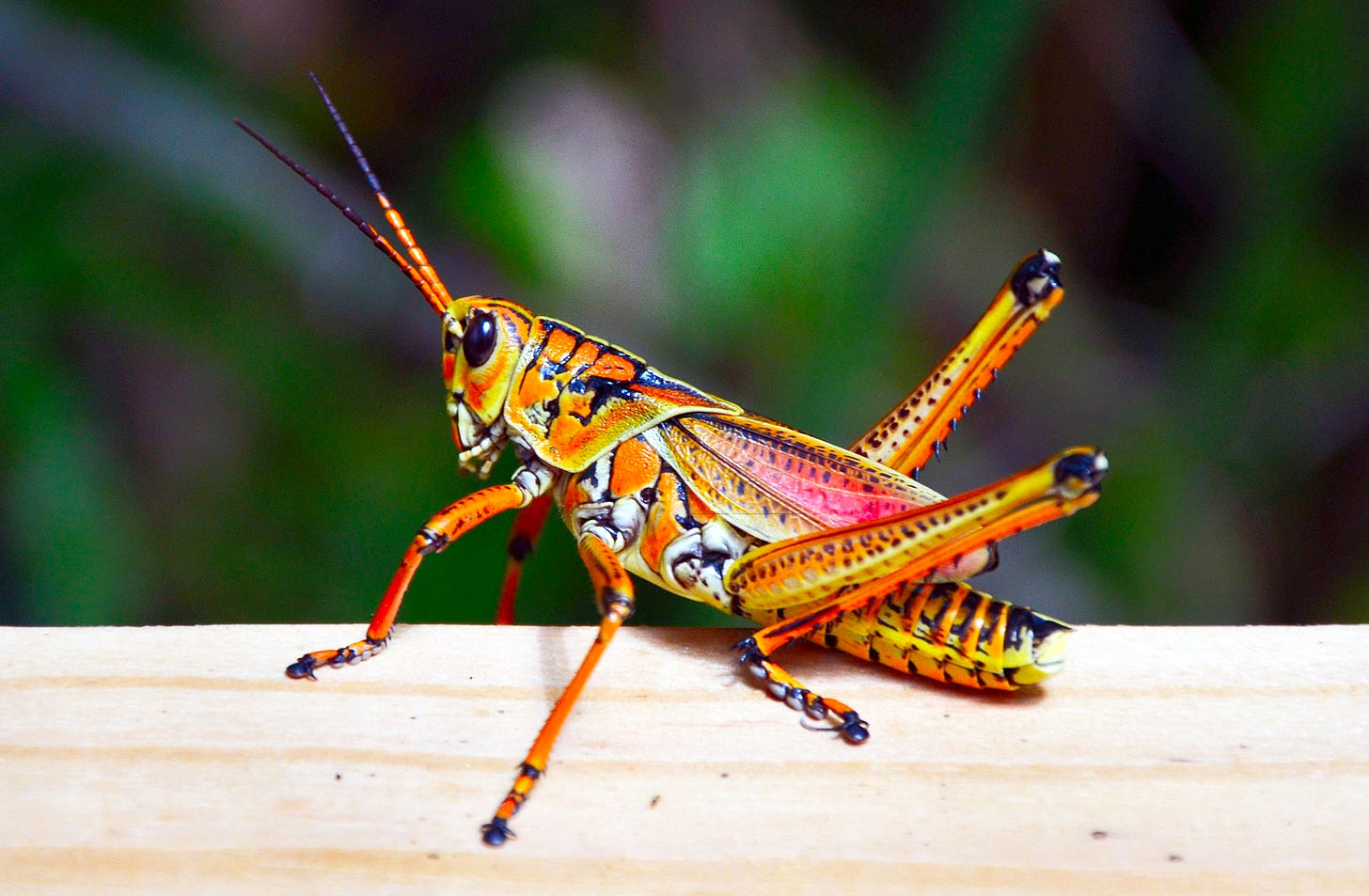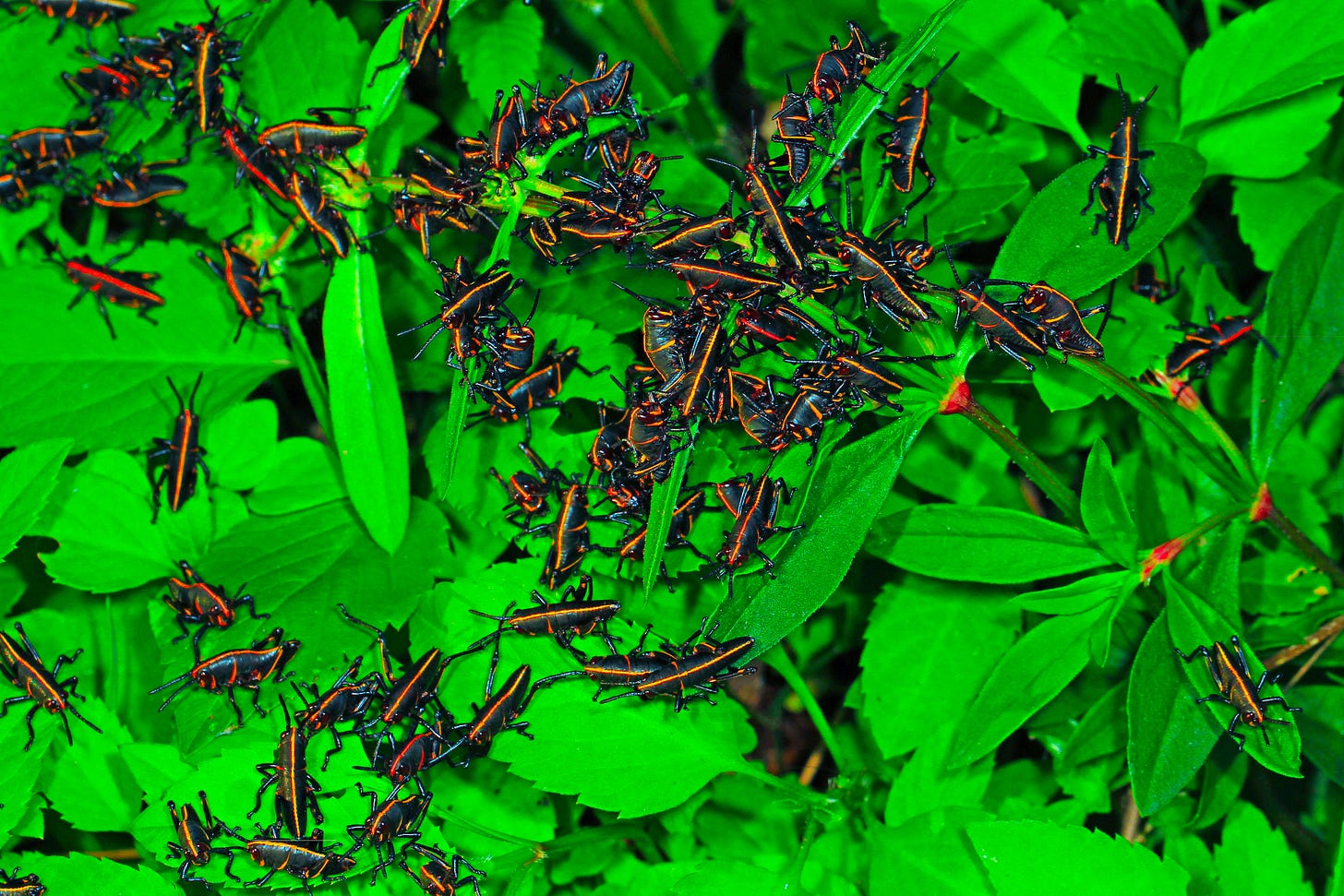Author’s note: Though new on Substack, this piece was originally published in 2014.
"I used to break their legs when I was a little girl in Africa", I overheard the tall woman say matter-of-factly. She was addressing her three young daughters as they strolled slowly down the Anhinga Trail in Everglades National Park on a blistering August afternoon.

Like most summer days in the Everglades, scores of huge, brightly-colored lubber grasshoppers perched themselves conspicuously along the trail. Their impressive size and curious mating rituals always provoke significant attention and—in this case—the unapologetic confession I had just overheard.
"Why did you break their legs, Mommy?" three slender girls in delicate dresses asked with wide-eyed curiosity. Out of sync with the sluggish pace with which they walked, the mother's response came fast and quick, "For fun!" Her tone was nostalgic.
I quickened my pace and passed the family as I felt a knot form in the pit of my stomach. I had no intention to meddle in other people's conversations. I am generally reluctant to judge the manner in which others choose to interact with the natural world around them. After all, who the hell am I to judge? Nothing qualifies me as the grand arbiter of environmental ethics. I am neither Leopold nor the Lorax. Plus, I have considerable blood on my own hands.
God only knows how many insects I maimed and killed that very day before arriving to the Anhinga Trail myself. How many did I crush beneath my feet during my pre-dawn jog? How many did I inadvertently condemn to death in the grill of my car during my morning commute? And how many biting insects swarming in the park felt me—quite literally—dispense the hand of justice?
Despite my admitted complicity, the woman's frank words continued to trouble me as I departed the trail. Her unsolicited testimony continued to loop in my head throughout that night. Even several days later, recalling the exchange still tightened the knot that had first formed in my stomach almost a week before. Intellectually, I don’t quite understand why.
Tactile experience is clearly one of the most potent ways in which we connect and commune with the natural world. It is basic, instinctual, and inherently human—an omnipresent function of our biology. Often, we are compelled to feel, hold, press, and test to truly understand the limits, constraints, and possibilities of the world around us. Early in life, such trials can sometimes result in unintentional harm to the living subjects with which we interact. And as very young children, the full ramifications of even lethal experiments can sometimes escape us due to a lack of personal experience or proper guidance.

What troubled me, then, was not the long-ago actions of a bored, young child in Africa. I’m certain we could find similar parallels among children of any culture. What truly left me unsettled was the exuberance with which—as a grown woman—she needlessly shared her memories of wanton abuse with her three young girls. As a parent myself, it bothered me that she felt compelled to promote such cruelty to her own children—innocent souls that clearly had never construed “fun” to include forcefully yanking appendages from a harmless grasshopper.
As we age, the passage of several decades should presumably impart the proper perspective to reevaluate and reconsider the actions of our youth. Personal experience with illness, suffering, and death among our loved ones should foster some spirit of empathy. Prolonged exposure to the daily miseries of assault, warfare, hatred, and torture should steer us away from being party to unnecessary pain. At the very least, our recent decades of heightened environmental consciousness should cultivate a greater appreciation for the inherent value of all species, and a desire to prevent wanton malice against other sentient beings.
Over the course of her gradual transition from child to parent, shouldn’t this young mother now regard her past dismemberment of grasshoppers with even a modicum of regret? In my mind, such memories should be a profound source of shame, worthy of either reticence or abject apology, especially in the presence of her young girls—anything, in fact, but the exuberance displayed that day on the trail. I continue to wonder how a mother’s unabashed normalization of heinous childhood acts might influence the psyche of her young kids as they age in turn.

Fortunately, the mental torture I endure from an off-handed comment about lubbers is mine and mine alone. Unlike their distant brethren in Africa, the grasshoppers in Everglades National Park enjoy a measure of protection from harassment. As such, they blithely pile atop one another, click their wings, swirl their antennae, and mate vigorously and repeatedly.
A large new crop of grasshoppers is clearly destined to arrive next spring. And with them, perhaps, will arrive a new season of understanding.
Subscribe free-of-charge to receive updates delivered directly to your inbox.
As you know, I don’t charge a dime for my priceless thoughts. But if you’re inclined to provide support, here are a few ways to do so:
If you liked this post share it with your friends with a kind word using the button below, or
connect with Noon at the Park on Twitter, Instagram and Facebook, or
Buy yourself something nice on Amazon. Start with this personalized recommendation, but feel free to put whatever you want in your cart and hit “Buy Now”, or…
you can just send me a beer.
See? You don’t need to buy a subscription to the Washington Post to support quality journalism!



